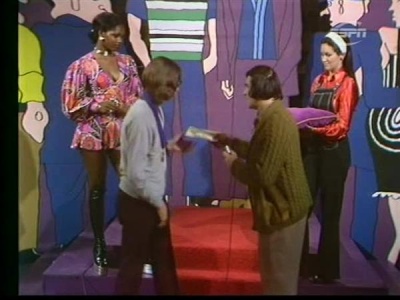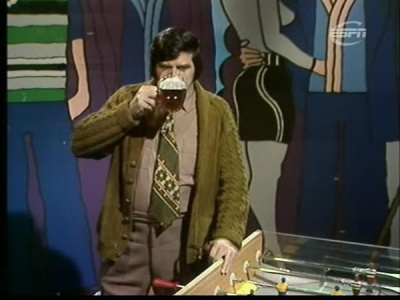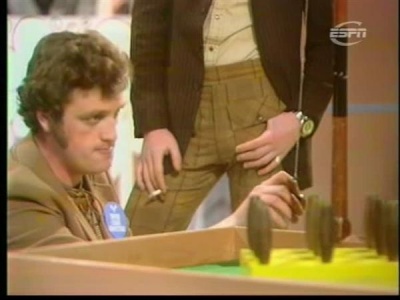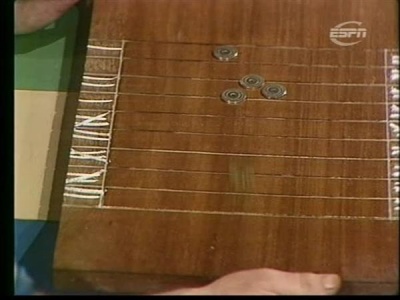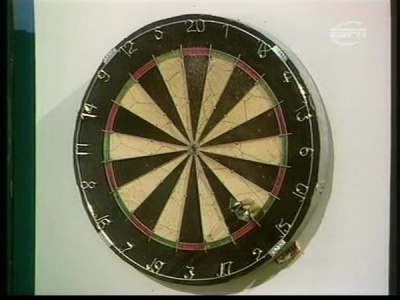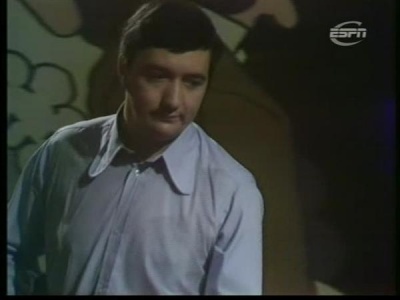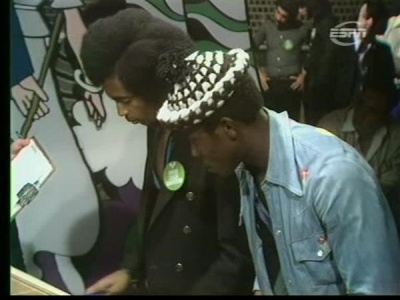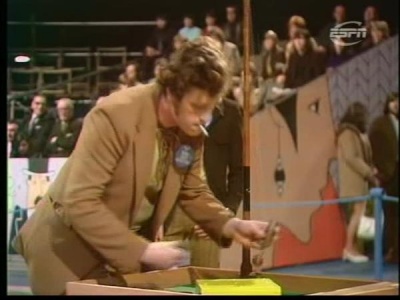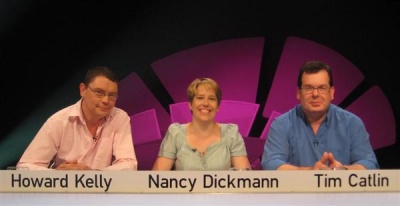Weaver's Week 2012-11-04
Last week | Weaver's Week Index | Next week
If we're to believe Channel 4's 100 Worst Moments from TV Hell, The Indoor League was the 84th worst show in the history of television from 1936 until the list went out in 2000. It's only half as bad as The Minipops, slightly better than Club X, and one position more hellish than Mr and Mrs. After all, Mr and Mrs has been a complete failure, one that certainly isn't going to be recommissioned by S4C. Or renewed by ITV at the heart of their Wednesday night schedule.
This is, of course, complete balderdash. 100 Worst Moments from TV Hell was the apotheosis of Channel 4's sneering list shows. They peddled an inverted Tory view of television history – believing not only that perfect television was achievable, but perfection was happening now. The contemporary world of Richard Blackwood and Ali G was the pinnacle of entertainment, and that everything in the past was rubbish, purely because it was from the past.
Some of us subscribe to a more Whiggish view of television – that everything can be improved through effort, and we can look at the past and learn from it.
Contents |
The Indoor League
Yorkshire Television, 1972-4
For this review, we've looked at the first two series of The Indoor League – a six-episode run that went out in the Yorkshire region during 1972, and thirteen episodes networked during 1973 and 1974. Fred Trueman is Your Host, and for most of the episodes he's going to be gently supping from a pint of beer. Or, at the very least, something from a beer glass.
The basic idea of The Indoor League was to celebrate the traditional games played in the pubs and working men's clubs of Yorkshire. And, latterly, of other places in the deep south, like Northamptonshire and Staffordshire. Maybe there will be some raiders from that London country. Furreiners.
Five contests took place in the inaugural series. We'll begin with table football, which is – basically – table football. Little plastic men on rods, flick them to move a ball up and down the table, hope to score a goal. Sounds simple, sounds reasonably dull, and with average players it is dull. Here, it's clear the players were at the top of their game, able to shimmy and dummy, manoeuvre the ball from the right wing to the centre, from midfield to the attackers, waiting patiently, hoping to draw the opposition into a false sense of security. And then! Unleash a shot! Power! Vam! Not just back of the net, back of the hall. First to six wins.
There was some skittles. But not your usual sort of skittles, this was table skittles, with nine little wooden pegs, and a ball on a chain to swing round and hit the skittles. Three throws to knock them all over, and should all nine come down early, there's the chance of a spare. The winner's the one to reach precisely 101 – a score of 102 will not do, and if the first player does it in three throws, his opponent can win it by reaching 101 in two. Perhaps this wasn't so televisual, we were rarely treated to more than a dozen throws per game.
Another game was bar billiards. This is a lovely little game, in which players try to put balls down holes in a table without knocking over some mushrooms placed on the table. It's complete in ten minutes, and though it sounds simple, a single game proved that it's got a lot of strategic possibilities. As one of the mushrooms will wipe out the player's entire score, there's jeopardy to the finish.
"Henry VIII used to knock about the shove ha'pennies," suggested Fred Trueman. Personal knowledge, there? Five metal discs are shoved up a wooden board, which is split into nine divisions slightly wider than any of the discs. After all five half-pennies are fired, any that are entirely in one of the beds count, and – under the television rules – the players were able to shoot those coins again. The object is to have three coins rest in each bed, and the first player to fill all of their beds wins. It's a game of Newtonian mechanics, but also of strategy – it's possible to advance coins up the board during a turn, and almost impossible to bring them back down.
But it's the darts that we found most intriguing. For the first series, they played on a Yorkshire board, one with 20 segments and a doubles ring. No trebles, and no outer bull. It turns the game into one of skill – the top score is no longer 180 but 150 from three bulls, or 120 from double-tops. But if you're just slightly out when aiming for double-top, the dart lands out and there's no score. It's a great test of skill, and because the legs last that bit longer, the better player wins more readily.
For the second series, some new sports joined the treble ring on the dartboard. There was arm-wrestling, which is arm-wrestling. Then there was cheese skittles, which is skittles played by throwing large round discs of wood at a diamond of wooden skittles. It's fast and it's loud, and it's got an interesting scoring system. Three throws each, whichever player scored more in their throws wins the round, and whoever wins the best of five rounds wins the game. Players could have a nightmare of a round and still remain in contention.
Then there was "a game you've only ever seen in the movies", Yankee pool. Stripes versus solids, first to pot their colours and the eight-ball wins. One of the competitors was a chap with a full head of hair called Willie Thorne. Ray Edmonds, the amateur snooker champion, took part. So did a young snooker player from Blackburn called Johnny Virgo. Whatever happened to him, eh?
For the time, prizes were substantial – £100 for the winner, £50 for the runner-up, and £25 for the semi-finalists. Stick a 0 on the end for modern-day equivalents. £1000 for being a bit good at arm wrestling isn't life-changing, but it is a good weekend's work.
It wasn't just ability that was on display, but stories could be told. Over the course of a show, and over the series, The Indoor League was able to draw out characters. James Porter, a competitor in the skittles, was a story in his own right – he recorded his heat on his 75th birthday, and it's remarkable to think that here was a game show competitor born in the nineteenth century. To take the table football, the story in series one was Eric Crane and Stephen Kelly, the cocky students from Leeds University who thought they could beat all-comers, and proved that they could beat all-comers by beating all-comers. A year later, we were able to follow another Yorkshire pair, John Kropacz and Frank Bowkett, against the raiders from London Speedy Campbell and Berris Hall. The pair's semi-finals were tactical battles, the final an all-out attacking affair.
That storytelling is a tribute to producer Sid Waddell. So was the way each programme was constructed. There would rarely be more than one final in each episode, and sports would be spread out through the series. It felt like Fred was wandering around a hub of activity, bringing us with him as he spent a little time here, a little time there, talking with the more experienced commentators, and always happened to be in the right place to catch the end of the final. We enjoyed the captions, making it clear what was going on, without being a distraction in the corner. We didn't like the way some competitions would be left hanging until next week, but we did enjoy how a no-score-draw arm-wrestling contest would be dipped in-and-out through an episode, until the conclusion was shown while the credits rolled. Putting action underneath the credits? Oh, that wasn't invented in 1994.
This was a men's world – in the entire first series, there was just one woman competitor, Vera Poberezhec of Bradford via the Ukraine. Her opponent had an equally exotic name, John Smith. For the networked series, there was a women's darts competition, and one "lass" in the table football, but that was the only female input we saw – apart from the hostesses whose role was not entirely clear. We can look on this and note how times have changed. Not just from the role of women – there's no surprise to see players smoking at the table, and some of the fashions are as brown as they are regrettable. One loss from the first series was Geoff Brayley's wonderful art deco graphic, replaced by a pub image we found slightly seedy – did they really mean to imply that the barmaid's top was that low-cut?
Would something like The Indoor League work on television today? Perhaps it might. The BBC and the main ESPN channel televise world-class darts, and the Eurosport channels have covered arm wrestling, table football, and various flavours of Yankee pool. Or "pool", as it's generally known now. We're surprised that snooker supremo Barry Hearn invented the tedious Powerball variant rather than raiding bar billiards for ideas – a frame of the old game is completed in about twelve minutes, which should be perfect for television companies.
The fashion in recent years has been to provide in-depth coverage of one sport at a time, rather than gadding about between disciplines. The television executives reckon that fans of rugby aren't interested in horse racing, and neither would like to watch major league biathlon. Perhaps they're right, but we reckon that there's a place for a low-budget programme showcasing various little sports and games. Indeed, given that ESPN's cupboard for next season seems to be little more than darts and fencing, maybe they could commission a new run.
Only Connect
Quarter-final 2: Footballers v Cinephiles
Can we borrow a hat, chief? Two of the best winners from the opening round are clashing in the quarter finals. One of the Footballers collects musical instruments he cannot play; one of the Cinephiles has read every Rebus novel ever written.
The Cinephiles had possession in round one, and Alaska and Samoa confuse the teams a bit. On three clues, they go for "dates that did not exist", and the final clue would have been 01.30 at the start of summer time, so two points. For the Footballers, it's a piece of cake. They go on two clues, but it's not cakes named after a hotel, nor food with a hole in the middle, but foods with their own name printed on them.
Audio for the Cinephiles, the theme to Pick of the Pops, a music hall number, a familiar classical piece, and some Bob Dylan, a man who makes Gary Barlobe look interesting. Not wind, not weather, but songs containing the names of musical instruments. "At the sound of the swingin' cymbal", "Tubby the tuba", "Gabriel's oboe", "Mr. tambourine man". Not 'arf! Ptomaine, Biowarfare, Foregone – and the Footballers reckon it's something about the words. Embedded US states, Arkansas would have been the fourth clue, two points.
Pictures for the Cinephiles, a squid, a turtle-shell, a banana peel, and a toadstool. "Things seen in Super Mario", is the slightly confused response. Items in Mario Kart is the formal answer: mushrooms are power-ups, turtles are weapons, squid obscures the opposition's screen, and the point is theirs. Various song titles for the Footballers, and the answer "All sung to our national anthem" is accepted for two points – the final clue would have been "God save the Queen", making it a trivial statement. Footballers have a small lead, 4-3.
To Sequences, where the Cinephiles have episodes of Fawlty Towers. Which came after "Gourmet Night"? Not "Waldorf Salad", which is the basic plot of "Gourmet Night", but "The Germans", being episodes 3-6 of the series. Victoria is convinced the greatest sitcom of all time is Porridge. Pictures for the Footballers: a model, a politician gentleman, and they go for it. Iain M Banks. They were Mary J Blige and Stephen K Amos, and three points.
High Level and Swing have the Cinephiles thinking about bridges, then comes Tyne, so what comes afterwards? Might we be heading to the coast in Newcastle. "The Forth rail bridge". No. "Millennium", or the Blinking Eyelid bridge, for another bonus. The perils of being soft southerners, there. For the Footballers, if M(4) = 127 and M(3) = 31 and M(2) = 7, what does M(1) equal? 1 or 3? They guess 3, it's absolutely right, and they have absolutely no clue why. It's Mersenne prime numbers, those one less than a power-of-two. Obviously.
Kingston to Kensington and Chelsea, then Windsor and Maidenhead. The Cinephiles are reckoning it's Royal Borough status, and guess 2011 Wooton Basset. It's certainly not 2012 Tower Hamlets. The answer is 2012 Greenwich; Wooton Basset isn't a borough but a town. Grands National for the Footballers: Fairyhouse and Aintree and Ayr, so they reckon Chepstow for the Welsh running over Christmas, and two points. The Footballers have stormed ahead, now leading 13-3.
Footballers get Wall 219 on the website, and know that Press Gang was a TV show. There are some European regionalities – specifically, regional languages of France, like Basque and Alsatian. There are terms in train engineering, but that group doesn't quite come out. They move to the TV shows, and they emerge first time. Then there's a long discussion before the final groups are confirmed. The groups emerge – TV shows is not enough, and it's not Benedict Cumberbatch shows. "Nice if he was in everything." Steven Moffat shows, the answer there. There are crocodiles. The last group is types of stripe. Six points!
The Cinephiles have Wall 220. Straight away, they get loan words from Yiddish, and then synonyms for people being idiots. There's a discussion of Irish politicians, and of chicklit novelists. "A vexed name", suggests the host. And the final group? Pokemon characters, obviously: what else could a Jigglypuff be? Ten points.
So the gap's closed a bit, and the Footballers now lead by 19-13. Four names for the same thing – a panther – and that's to the Cinephiles 3-1. 2012 Olympic venues is a 1-1 draw, and Things represented by "OC", goes to the Cinephiles by 2-(-1), and no-one gets "Officer Commanding". Which means the Cinephiles have 19, and the Footballers have 20.
Which means the Footballers progress by the skin of their teeth. And if you want it to be easier next time, start praying.
Countdown Update
It's not quite thirty years, but it is a fair time since we last looked at Countdown, so here's the news since the summer break. Andy Rossall was the carryover champion, he finished with two wins. Then came Liam Shaw, who won 8 games while amassing 708 points. Cue the usual remarks of "it's enough to win" and "only having to beat the opposition". In truth, he had four very good performances, three entirely decent ones, and rode his luck a bit on one game. Adam Flinn kicked off with a century, the first of three wins (303 pts).
Tia Corkish and Rose Boyle would win the next sixteen games for the women, scoring 697 and 701 respectively. Tia blew hot and cold, there were a couple of games she'd have lost against decent opposition, but her last two matches were superlative performances. Rose had five excellent wins in her first matches, but perhaps was a little fatigued for the next day's recordings. Since then, Dave Boyle has had one win, Amy Gilbert and Lucy Grainge two apiece, and Philip Jackson is the defending champion with two wins of his own.
With six-and-a-half weeks until the finals, the leaderboard is:
| 1. | Paul James | 8 | 794 |
| 2. | Liam Shaw | 8 | 708 |
| 3. | Rose Boyle | 8 | 701 |
| 4. | Tia Corkish | 8 | 697 |
| 5. | Chris Marshall | 8 | 682 |
| 6. | Grant Waters | 7 | 722 |
| 7. | Baljeet Nijjhar | 3 | 338 |
| 8. | Adam Flinn | 3 | 303 |
A slim chance of an all-octochamp finals board, but equally someone could slip in with four wins. It's difficult to see anyone defeating Paul James, but then Countdown is a best-of-one format.
And there's more to come! Countdown will be made in digital high-definition from the start of next year – the O will never have looked quite so round. Filming moves to YTV's expansive studios at New Trafford, just across the canal from BBC Salford. And, to mark thirty years of Countdown, there will be another Ultra Championship, because it's been quite long enough since the last one. There are eight weeks of matches involving players mostly – but not exclusively – active since 1997. It would be entirely iniquitous to single out individual players, because we're actually excited about all 40 matches.
There is some slightly disappointing news – Countdown will be moving to the earlier time of 2.40 from next week, allowing Channel 4 to show some here-today-gone-tomorrow quiz. To watch the programme at the proper time, we recommend watching 4seven, where it'll begin at 4.40.
This Week And Next
That may be the only time anyone ever says "we recommend watching 4seven".
The last University Challenge heat was contested by Warwick and Aberdeen, and neither side was aware of the Unified Field Theory of Creep. Warwick did know more of the early starters, and the first visual round was on scenes from films recreated in Lego. "Lord knows why," said Thumper, perhaps forgetting that University Challenge is in itself an utterly trivial and somewhat ludicrous affair. As is commenting on it.
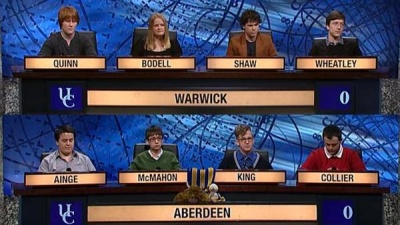 Warwick: Sean Quinn, Sarah Jane Bodell, Andrew Shaw, James Wheatley.
Warwick: Sean Quinn, Sarah Jane Bodell, Andrew Shaw, James Wheatley.
Aberdeen: Thomas Ainge, Sean McMahon, James King, Ross Collier.
A brief Aberdeen revival was ended by Warwick proposing "The Q Factor". The Format Doormat Hellcats can see it now. "The lines are open! The performers are in them! Britain's got The Queue Factor! Someone's wearing a bad pullover – they are tonight's queue jumper." Featuring such interesting people as John Major, Sunita from Big Brother 3, people waiting for the Pearpad 3, and Gary Barlobe.
All of this was far more interesting than the actual game: Aberdeen briefly threatened to pull close again, but Warwick moved ahead once more. Neither side was particularly good on the bonuses – the winners finished on 13/33 – and Thumper had a snicker when it was suggested that David Cameron was born during the reign of Mrs. Margaret Thatcher. "Harold Wilson", the answer they weren't searching for. At the gong, Warwick carved out a win, 175-100.
Which brings us to the repêchage special we promised last week. For University Challenge, it's now complete:
- Lincoln Oxford, who lost 175-180 to Manchester
- Kings Cambridge, defeated 145-175 by St George's London
- Homerton Cambridge, downed 145-230 by New Oxford
- Lancaster, losers by 140-200 to Pembroke Cambridge
It's notable that these sides have outpointed three heat winners – Bangor and Bath won with 125 points, Bristol with 120.
For Mastermind, it's not entirely clear whether third-placed contenders will be allowed back. Assuming they will, the six places are, after 11 of 24 heats:
- Chris Cann – The Savoy Operas of Gilbert and Sullivan – 29 (2)
- John Wheeler – The Shipping Forecast – 29 (5)
- Helen Marshall – Catherine of Aragon – 28 (3)
- Paul Whittaker – George Harrison – 27 (2)
- Chris Quinn – The Novels of Roddy Doyle – 27 (3)
- Alan Sharp – Everest Mountaineering – 26 (3)
- Nathan Joss – Elizabeth I – 26 (3)
Should the decision be to take second-place finishers only, Mr. Quinn, Mr. Sharp, and Mr. Joss will not return, and the last two places will be taken by:
- Philip Walters – Dr Who – 25 (1)
- Nina Fetherston – Guns n' Roses – 25 (1)
The BBC's editorial board has finally ruled on a question about the 2011 So You Think You Can Dance final. With two performers leaving the final halfway through, presenter Cat Deeley announced the third-place finisher before the fourth-place finisher. This was an editorial judgement, and the board ruled it was perfectly fine. What wasn't acceptable was the website reversing those placings, preserving an inaccurate ranking for some months, and only correcting its error a year and a half later. The board noted that this would be damaging to the careers of the performers affected.
BARB ratings for the week to 21 October show that Strictly Come Dancing is a hit – 11m for the performance shows. By its own high standards, The X Factor is a miss this year, though 8.85m for the results programme is still a tremendous score. The Great British Bake Off came third for the week, 6.75m saw the series final. It's BBC2's highest rating since (er) August, when The Eastenders came visiting for a fortnight. Or since Top Gear pulled in such figures in 2007-8. More tellingly, it's half-a-million more than the Masterchef final attracted to BBC1 in March.
Elsewhere, HIGNFY attracted 5.65m, Pointless Celebrities entertained 4.35m, and Mr and Mrs had 3.9m viewers. Splash! with Adrian Chiles and Gabriel Gatehouse had 3.5m viewers; Poland's Got A Closed Roof had 3.3m thinking "actually, the splashing was better." Daytime The Chase had 2.9m viewers, we think that's a best for the year. Come Dine with Me was C4's top game show, 1.6m viewers.
Further up the EPG, Celebrity Juice brought 2.07m to ITV2, where 1.01m saw Xtra Factor. Only Connect was seen by 935,000, and The X Factor Us by 715,000. Last year's editions of The Chase With Celebrities popped up on ITV4, 210,000 saw the repeats; that compares to 245,000 for America's Next Top Model on Living, and 265,000 for Masterchef Australia on Watch.
This column's going to have to be careful what it wishes for. Flushed with the success of the pilot episode, ITV has ordered a full series of Splash! Adrian and Gabriel will be joined by BBC Young Sports Personality of the Year Tom Daley, who will train various ITV celebrities in the art and craft of sliding about on a waterlogged field. Channel 4 has also answered the question we posed two weeks ago, "Who are you and what are you doing on my channel?", by moving Baggage to E4. The last two episodes go out in the next two Saturday teatimes.
Before then, it's double or quits for Masterchef fans: Junior Masterchef (CBBC and BBC1, 4.30 weekdays) and Masterchef The Professionals (BBC2, 8.30 Mon, 8pm Tue – Thu) are both back. There's a special Who Wants to be a Millionaire (ITV, 9pm Friday). TV3 in Ireland has Junior Mastermind (7.15 Sunday). Next Saturday has trope-namers The Cheeky Girls on Pointless Celebrities (BBC1, 5.40), Tess and Claudia having a girls' night in on Strictly (BBC1, 6.30), Gary Barlow on The Q Factor (ITV, 8.05), and The Making of XI (BBC2, 9.45).
To have Weaver's Week emailed to you on publication day, receive our exclusive TV roundup of the game shows in the week ahead, and chat to other ukgameshows.com readers, sign up to our Yahoo! Group.

